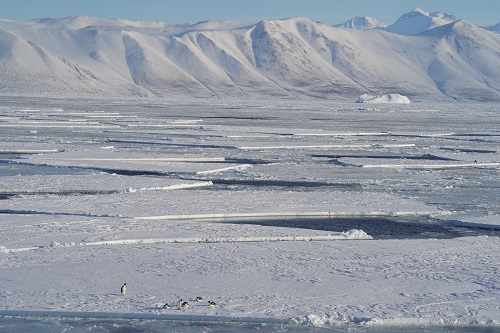Dolan, P and Millwood Hargrave, M., The Antarctic Parliamentarians Assembly - Diplomacy and science. Geoscientist 30 (6), 24, 2020
https://doi.org/doi: 10.1144/geosci2020-094, Download the pdf here
Peter Dolan (FGS) and Martyn Millwood Hargrave report on the inaugural Antarctic Parliamentarians Assembly, held in Westminster in December 2019
 The inaugural Antarctic Parliamentarians Assembly was hosted by the UK government in London on 2 and 3 December 2019 to mark the 60th anniversary of the signing of the Antarctic Treaty and to discuss the future of the ‘White Continent’.
The inaugural Antarctic Parliamentarians Assembly was hosted by the UK government in London on 2 and 3 December 2019 to mark the 60th anniversary of the signing of the Antarctic Treaty and to discuss the future of the ‘White Continent’.
Left: First year ice off the Royal Society Range, Scott Coast, Antarctica c. Martyn Millwood Hargrave
Parliamentarians from 13 signatory countries, including most of the seven who claim sectors of Antarctica and other interested parties such as China, issued a final conference statement and press release, available at https://www.antarcticparliamentarians.com/download
The meeting featured presentations on climate change, natural resources (primarily fishing), scientific research, geopolitics and tourism. (Since first drafting this report, COVID-19 is, of course, likely to severely limited tourism in the short to medium term.) But what were the ‘takeaways’?
Global impact
Despite its remote location, Antarctica has a global impact. This is partly because circum–Antarctic deep sea currents are connected to those in other oceans, affecting their path and nature. Changes in circulation in the south are, for example, predicted by fisheries experts to have a very negative impact on fish stocks in northern polar areas in years to come.
Antarctica is both a victim and engine of change. These ocean currents contribute to climate change which in turn is driving the anomalous and rapid temperature increases being witnessed in West Antarctica. The melting of huge glacier systems (e.g. Thwaites and Pine island) and calving of ice shelves as a result of currently escalating CO2 emissions and global temperature increases are virtually certain to lead to global sea level rise of 30cm to 50cm over the next few decades. But here, Antarctica’s influence on the rest of the world arises again: whatever the sea level rise, it will be greatest in northern latitudes due to the gravitational pull of northern hemisphere landmasses. Coastal cities such as London, New Yorkand Shanghai, beware.
So what to do? The parliamentarians and their advisors had no ‘silver bullets’ to offer. Their final statement “Noted with concern …the profound effects of climate change on Antarctica’s ecosystems and the potentially catastrophic effects of Antarctic ice loss on global sea level.” They agreed to:
- Uphold the Antarctic Treaty System.
- Establish the Assembly as a biennial gathering.
- Protect and conserve the Antarctic environment.
- Promote and support international scientific collaboration
- Ensure effective management of activities in Antarctica.
Enthusiasm and concern
We left enriched by the enthusiasm of the participants and the science but concerned at the inevitability of severe impacts from global sea level rise over our children’s lifetimes.
There are many geoscience contributions we can make to mitigate the underlying drivers of climate change, and our profession and community should work hard to push these areas: CC(U)S, geothermal, facilitating efficiencies in the necessary harvesting of natural resources, etc. In the meantime, the buzzword from the environmental engineers was on increasing coastal resilience. It looks like we will all need it.